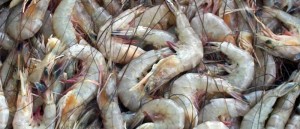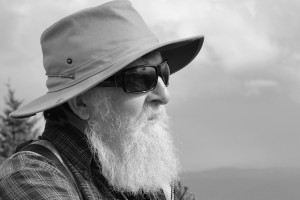 Brad heaved what might be a truncated stainless steel water heater onto his table under the ancient live oaks.
Brad heaved what might be a truncated stainless steel water heater onto his table under the ancient live oaks.
“Still peddling your miraculous apparatus?” Marquis said and plucked a dog-eared brochure from Brad’s stack. “Looks dubious, old man. Hmm… Lead lining and rechargeable battery.”
“If I was a person of color like yourself…”
“Bullscat. Everybody got a color.”
Cars swished by on the road. Breezy. Hot. Seagulls gliding overhead. Marquis stood behind his van, handing out bags of fresh shrimp and ice, taking in cash, improvising rhymes. Brad sagged in a chair at his tailgate while massaging the small of his back.
A Cadillac squeezed between the road and the salesmen, the driver one of those southern ladies who never sweats, but only glows. She left the engine running. “Two pounds of jumbos, please.” The Cadillac’s air conditioner kicked into high gear. “What are you selling?” she asked Brad.
“I invented… Um… It converts matter to energy, ma’am.”
“What’s it for?”
Marquis grinned like he knew what was coming.
“It’ll power your house for pennies a month. I mean, using gravel from your driveway.”
“Our driveway is paved.”
Brad sighed.
“We do need backup for hurricane season.”
“Eighty nine hundred dollars,” Marquis said.
The lady lit up, impressed.
“What? He’s lying,” Brad said, pink turning maroon. “I’m asking five hundred.”
“Decent price,” she said, diminished considerably.
“Want a demonstration?” Brad asked, but the woman and her jumbos were moving toward the Cadillac. They rolled away.
“Her manner of saying ‘hot dang scam,’” Marquis said. “Have you tried selling electricity to the utility company, genius?”
“Nobody believes me. I wrote to research universities. A few sent me form letters. It was ten years before I created a single watt. Another ten before the generator stopped overheating. Then Dad died, my wife left, my son moved away, and our metal scrap business slid downhill. The creditors got mean and my property taxes are delinquent. Hey, I’ll give you a demonstration.”
Marquis laughed. “No, no, please.”
Brad looked down the road. “I don’t care anymore.”
Shadows crept underfoot as the sun arced over the trees. Trailing beards of Spanish moss swayed leeward. Shrimp customers came and went. Sold out, Marquis dumped the remaining ice and stowed his coolers.
“Here’s a pound I saved for you. Take it, free.”
“I don’t need anything.”
“Don’t be a jackass. Take it.”
“If you insist. Thanks. It means a lot.”
Marquis began lifting his folding table when a leg dropped off and thumped to the ground.
“Cacapoo!”
Brad grabbed the broken leg, his face twitching like he was recalculating his entire life. “Okay. Bring it to my junkyard and I’ll weld it.”
“Seriously?”
“Yeah.”
“I don’t know.” Marquis frowned at the stainless steel tub. “But you can weld.”
Brad packed up and Marquis followed in his van along a languid river. Auction notices and No Trespassing signs glared from the high fence surrounding the junkyard. Brad unlocked the gate and beckoned Marquis in. They entered a building of weathered wood, rusted sheeting, and slimed windows. Brad emitted a curse in the dim light. Marquis flopped his hand along the wall. Found a switch, but nothing happened.
“One second,” Brad said. Eyes adjusted, he selected a banana peel and a candy wrapper. Unscrewed a hatch in another tub, dropped in the garbage, tightened the hatch, and mashed a button. The machine hissed and began to purr, at which time blinding lights popped on everywhere and speakers blasted mind-splitting psychedelic rock. Brad rushed outside, dragged in the table, tossed it onto a workbench, and hooked up a clamp. He jerked on leather gloves, pulled a helmet over his head, snatched up another clamp with a welding rod attached.
“Don’t look!” he shouted, and slammed the face shield down.
The walls flashed like a baby sun was born into Brad’s hands. Crackling and humming. Metallic smoke rising. Fingers jammed in his ears, mouth open, Marquis marveled at the pulsing shadows.
“Hey, breaker box! Fan!” Brad pointed to a corner.
The giant exhaust fan’s thunder overwhelmed all other sound.
A long minute later the baby sun went dark. Brad flipped up his shield and made a cutting motion at his neck. “Fan! Stereo!”
The building hushed except for Brad’s tapping.
“Wow,” Marquis whispered. “Wow.” He stared at the generator, then wandered around the shockingly messy room. On a counter sat a full rum bottle, a headlamp, a bag of pills, and a box stuffed with unopened mail.
“Past due bills,” Brad said. “But none for electricity.”
Marquis picked up a handful of envelopes. “You got a letter here. A personal letter.”
Brad threw down his hammer, grabbed the letter, and dropped into a chair. Opened it and read. He was quiet.
“What?”
“From my son.”
“That’s good, right?”
“You don’t understand. Those pills? If I didn’t sell a generator today, I planned to swallow them with the rum. Everything but the generator has failed. I’ve sacrificed everything else and finally gave up. But when your table broke, I was needed.”
Marquis waited.
“Ralphie wants me to live with him.”
“Will you?”
Wet-eyed, Brad nodded vigorously. “Judy and my grandkids want to see me.” Brad started packing in a whirlwind, Marquis helping.
“Listen,” Brad said. “The device is patented, and the plans, equations, diagrams, procedures, and manufacturing techniques are in a safe-deposit box in custody of my lawyer. He hasn’t been paid, so he won’t be cooperative. But here’s a notarized document giving it all to you. Read the fine print. Fill in your name. I built two generators and I’m taking one. Here are all your keys.”
Marquis was awestruck.
Brad loaded the suitcases into his pickup and jumped in the driver’s seat. “God bless!”
Marquis watched Brad roar away. He returned inside and switched off the generator. The room’s lights faded. Definitely needed better storage batteries. He felt his way to the door and drove the van out through the entrance. Locked the gates and stood back. My lucky day, he thought. He owned a miraculous invention, one to revolutionize the energy industry and make him fabulously rich.
Unbelievable.
All of a sudden he felt a horrible fear. Brad had left so fast and looked so relieved. What if the machine is a curse? What if he ends up like Brad, wasting his whole life in futility and frustration? What if the only way to escape is to convince another sucker to adopt the cause?
A hot dang scam!
Nah, Marquis thought. Bullscat. Sell shrimp, sell anything.
 Mickey Hunt invents stories and enjoys his offspring in Asheville, North Carolina. Readers can find other of his works through chaoticterrainpress.blogspot.com.
Mickey Hunt invents stories and enjoys his offspring in Asheville, North Carolina. Readers can find other of his works through chaoticterrainpress.blogspot.com.









































Nice work (and well deserved). Love the pic.
Thanks Jeff!
Great story. Enjoyed it thoroughly.
Hey Mickey;
Good story, excellent writing. I love first person deep POV myself, it’s a tougher POV to write but you do a good job at it.
IMHO your premise is very plausible. Major breakthrough scotched by depression, superstition and lack of imagination. That about sums up the human condition doesn’t it.
However, I have a different angle on it that is also a norm in business and invention. My Swiss grandfather was an inventor who worked for a modest machine shop in Middletown, Connecticut back in the twenties. He had a shop in the attic of his home and he tinkered with stuff. Long story short, he invented the idea of frosting the inside of lightbulbs to even out the light and built a machine to actually do it.
Grand-dad took it in to show the owner of the machine shop where he worked and the guy told him that if he let the shop get the patent on it that grand-dad would have a job for the rest of his life. Pretty good for a first generation emigrant, eh?
Almost as soon as the patent went through Sylvania bought out the machine shop, and the patent then proceeded to fire everybody and shut the place down. …and the rest is history.
Grand-dad never kept any more notes on his inventions and turned to chemistry for his creative outlet. Some of his subsequent discoveries were sought after by furniture companies and undertakers; but the secrets those chemical compounds died with him. The family had some stock he’d made up that they used to fill orders for a while and my mother had a couple of bottles of one of his furniture polishes that she used up on our furniture when I was young. It worked better than anything available on the market today; but we could never get an analysis to duplicate it.
So secretiveness and stubbornness winds up hiding a lot of breakthrough’s too, I’d guess.
Write on bro
😉
Thanks for your thoughts, and your biographical story, Dave.
I have often wondered if innovation is held back by sheer market forces. Say, Company X is currently selling generation A technology in a product, but they’ve already have developed prototypes for generation E, and they know consumers will buy generations B, C, and D in succession, so they trot them out over a few years and cash in on those who always buy the new thing. It’s just speculation.
“Genius” is a bit of a metaphor for anyone who has a revolutionary idea, or one subversive to a dominant and unhealthy culture. At some point in life you want to retire from the battle and try to regain what you lost–what’s most important–and for me that’s family relationships.
One small slice of personal biography behind “Genius”: As Brad’s son did, I wrote my dad a letter inviting to come live with me and my family, but unlike Brad, my dad turned down the offer and committed suicide, in 2013. “Genius” was the first story I wrote after enduring the torture of dismantling what he left of his life, and emptying his and my mom’s apartment. (She died a month and a half after he did.) Fiction for me often tells the story I wish happened. As for non-fiction, I cleaned and sold the rifle he used to take his life and bought a nice camera with the money. I wrote a “biography” of the rifle and titled it “Savage”.
On a more pleasant note, the setting of the story comes from our many family trips (my wife and children) to Hunting Island, South Carolina, where we camped at the state park there. On the way back to the North Carolina mountains, we often stopped at the Gay Fish Company (that’s the name of the company) to buy several pounds of fresh shrimp that we cooked and ate when we arrived at home in the evening.